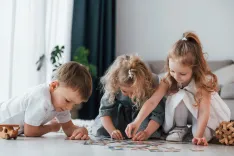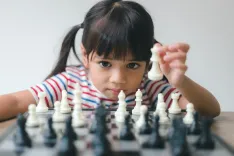Best Memory Games: Ideas by Age and Helpful Tips

Contents
Memory is one of the most important cognitive skills that directly affects school performance, problem-solving ability, and overall child development. Good memory helps children learn new things, remember information, and quickly navigate unfamiliar situations. Memory games for kids improve concentration, attention, and learning ability. They should be in every parent's arsenal, and only then come all other tasks for counting, words, and reading, because thanks to such a foundation, a child will be able to remember all these new concepts and terms.
Such games make the brain training process engaging and interesting. In this article, we'll examine why memory tasks are so important, study the best games by age, and give practical tips for choosing them.
What are the benefits of playing memory games?
Memory games improve concentration, attention, and learning ability. They are the foundation for many other skills and help children better cope with everyday tasks. Games to improve memory are beneficial because:
- Improvement of working memory. Working memory is the ability to hold and process information for a short time. This is a critically important skill for reading, mathematics, and logical thinking. Memory games for children train this ability, helping children more easily absorb new knowledge.
- Development of concentration and attention. In such tasks, little ones learn to focus on one task, ignoring distracting factors. This skill is necessary in school and daily life. It also serves as training for perseverance.
- Preparation for school learning. Memory is directly related to academic performance. A child who can easily remember information will find it easier to learn poems, rules, and solve problems. Games create a solid foundation for future academic success.
- Strengthening problem-solving skills. To succeed in such tasks, you need not only to remember but also develop strategy. Children learn to analyze information, draw conclusions, and make decisions. Brain games for kids are a sure path to developed logical thinking.
- Increasing self-esteem and confidence. Every time a child successfully completes a task, they feel more confident. Victory in a game brings joy and motivates them to continue learning and developing.
Memory Games by Age: Choosing the Right Challenge
Choosing memory games is not a universal process. For a task to be truly useful and interesting, it must be selected based on the child's age, interests, and development level. Too complex games can cause disappointment, while too simple ones quickly become boring. A properly selected activity will stimulate the child's brain without unnecessary stress.
Memory games for toddlers (1-2 years)
At this age, games should be simple and based on visual and auditory perception. The goal is not victory but the process itself. Despite many memory games for 2 year olds, they can be used earlier when the child is already sitting and actively exploring the world.
Where's the Ball?
Take two cups and hide a small object under one of them. Slowly switch the cups and ask the child to guess where the object is hidden. This is an excellent way to train visual memory and attentiveness.
Remember Who Sits Where
Seat three or four of the child's favorite toys in a row. Ask them to close their eyes, then switch two toys. Ask the child to find who moved.
What's That Sound?
Play recordings of animal or object sounds (for example, car sound, dog barking). Ask the child to guess what sound it is. This game develops auditory memory.
Hide and Seek with Toy
Hide one of the child's toys in plain sight. Ask them to find it, training their attentiveness and visual memory.
Games for Children 3-4 Years
At this age, children can already play more complex games requiring multiple players and remembering longer sequences. Memory development for kids is very important during this period when new neural connections appear literally every day.
Find the Pair
Before you is one of the card matching games – a proven and popular choice used by more than one generation of parents. There are other matching games, including online format in Keiki, but they're united by one thing – unchanging effectiveness. Lay cards face down and ask the child to find two identical ones. This is also one of the most effective kids memory games for training concentration.
Guess What's Missing?
Put several objects on the table. Ask the child to close their eyes, then remove one of them. Ask them to guess what's missing. Gradually increase the number of objects.
I'm Going Camping
The first player says: "I'm going camping and taking..." (names an object). The next repeats their phrase and adds their object. The game continues in a circle, training short-term memory.
Tell a Story
Start a story with one sentence. Ask the child to repeat your sentence and add their own. The game continues in a circle, and with each round the story gets longer, forcing children to remember everything said before.
Memory games for preschoolers (5-6 years)
Before you are not just memory games for kindergarten but a more universal tool for school preparation. Tasks become more complex and can include more objects or longer sequences.
Store
Take several toy products and put them on the table. Tell the child they're going to the store and must remember what to buy. Gradually increase the number of products. This excellently trains working memory.
Word Chain
Start the game with one word, for example, "apple." The next player must name a word with the last letter of the previous word, for example, "elephant." This develops auditory memory and vocabulary.
Memory Tower
Take several colored blocks. Build a tower using several colors. Ask the child to close their eyes and build the same tower from memory. Gradually increase the number of blocks.
Cards
Use a deck of cards. Deal each player several cards and ask them to remember them. Then collect the cards and ask them to recall which cards they had.
How Else Can You Develop a Child's Attention?
Besides special games, attention can be trained in daily life. There are many fun ways to improve memory:
- Detail games. Ask the child to find 10 differences in pictures or find objects of a certain color during walks.
- Reading aloud. When you read a book, ask the child to repeat a sentence they liked or retell part of the story.
- Nature observation. During walks, ask the little one to observe nature and remember, for example, what birds they saw or what flowers grow in the flowerbed. At home, ask about impressions, unobtrusively learning these details and praising their attentiveness.
- Developing physical skills. Physical exercises like juggling or playing ball also help develop coordination and attention.
Digital Memory Games – How They Help and What to Pay Attention To?
Online memory games are a win-win and universal way to train a child's ability to remember. They can complement traditional games and motivate children to learn. Such tasks are always at hand, you can occupy a child while sitting in line, traveling somewhere, or just resting after active outdoor activities. Keiki offers various memory development games, and here are some of them:
- Cards with vegetables, fruits, transport. We've already talked about the benefits of matching games for kids, but in online formats these tasks become even more effective. You don't need to buy separate card sets, they're already in Keiki. These are elements on different themes, with an interactive approach and pleasant tasks.
- Continue the Series. A comprehensive task for memory, logic, and attention. The child needs to continue a sequence of sea creatures or other characters to finish the series. The task itself allows adjusting difficulty, thus calibrating the game for different ages.
- Object Search. More related to attention building activities, but interacts well with memory too, as the child must constantly keep in mind what they're looking for among different, colorful locations.
- Hide and Seek. Cute animals hide in different locations, and the child needs to find them, remembering the task, different details, and even search sequence.
Free memory games for kids are an excellent way to train memory as they offer endless options, bright visual effects, and sound accompaniment. They can be especially useful for children who prefer interactive activities.
Digital games can track progress, allowing parents to see how their child develops. Keiki offers safe and educational memory development games, plus worksheets that allow training hand for writing and contain tasks that can be played without gadgets.
Practical Tips for Parents: How to Turn Memory Development Games into a Habit?
For best memory games for kids to become part of life, they need to be integrated into daily routine. Here are several practical tips on how to do this:
- Play regularly but briefly. Don't force the child to play for hours. 10-15 minutes a day is enough to get noticeable results. Regularity is more important than duration.
- Start simple. Don't complicate the game from the beginning. Let the child master the rules and feel confident before moving to more complex tasks.
- Use everyday objects. For memory games, you can use any objects you have at home: toys, blocks, fruits, pencils. This makes games accessible anytime.
- Make the game a family tradition. Play as a whole family, let memory building games for kids become part of your evening routine. When the child grows up, you can also use simple board games, many of which also work well with memorization skills.
FAQ
Yes, memory games can be useful for children with ADHD. They help train concentration, attention, and working memory, which is a key problem for children with this disorder. Brain games for kids can be part of therapy.
Benefits of playing memory games include improved concentration, attention, working memory, problem-solving skills, and increased self-esteem. These games develop cognitive abilities and help children learn better.
To improve short-term memory, it's important to play games that require quick memorization and reproduction of information. Games like "I'm going camping" and "What's missing?" are excellent examples.


